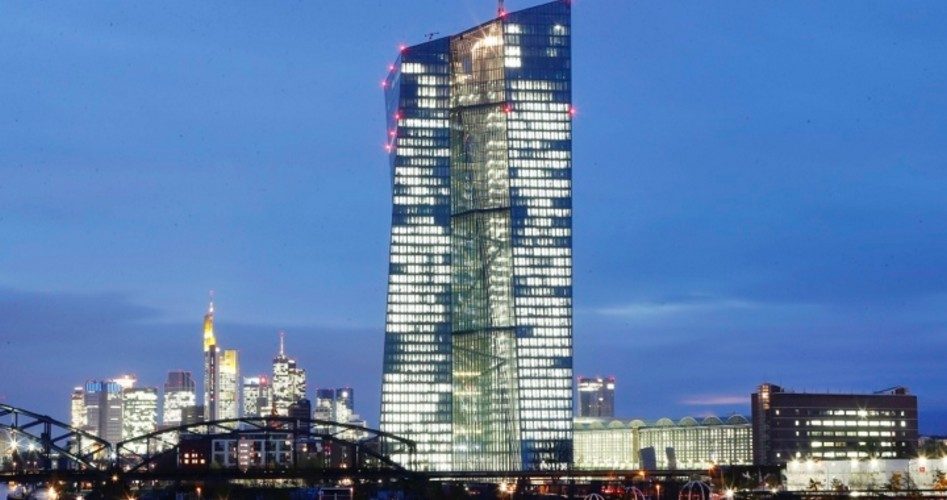
On November 21, European Central Bank President Mario Draghi announced that the ECB would be pumping more money into the euro bloc to fight what he called “excessively low” inflation.
“We will do what we must to raise inflation and inflation expectations as fast as possible,” Draghi told an audience of bankers in Frankfurt. “If … our policy is not effective enough to achieve this, or further risks to the inflation outlook materialise, we would step up the pressure and broaden even more the channels through which we intervene, by altering accordingly the size, pace and composition of our purchases,” he said.
Although many investors and financial commentators were surprised by Draghi’s announcement, they should not have been. As we reported months ago, the table had already been set for Draghi and the ECB to follow a Federal Reserve-style menu of inflationary options at the Fed’s Jackson Hole confab in August. We noted then that the Federal Reserve’s 2014 Economic Policy Symposium in Jackson Hole did not bode well for the global economy. The annual conclave of the world’s top central bankers and their privileged economist cohorts at the picturesque Wyoming retreat took place August 21-23. European Central Bank (ECB) chief Mario Draghi provided the big news, with a speech that indicated the ECB will be adopting the Fed’s policies of the past several years, principally “quantitative easing” (QE), a Fed phrase for currency debasement, or simply, counterfeiting by computer entry. Under former Federal Reserve Chairman Ben Bernanke and his successor Janet Yellen the Fed has magically conjured up more than $4.4 trillion out of thin air — and shoveled much of that into the palms of their fellow bankers.
The ECB should now be expected to copy the Fed’s bond-buying binge and go on a huge bond-buying spree of its own, creating trillions of new euros. This was really not “news,” however, since Draghi and the ECB had already embarked on their QE counterfeiting gambit at least as far back as the beginning of June with their revolutionary step of cutting bank deposit interest rates to below zero, meaning a negative interest rate. The Frankfurt-based ECB announced they were reducing the deposit rate to -0.1 percent, forcing banks to pay a charge if they continue to park money for safekeeping at the ECB.
But that was only the opening round, portending much larger actions to come, as Draghi made clear at the time. “Are we finished? The answer is no,” said Draghi. “If required, we will act swiftly with further monetary policy easing. The Governing Council is unanimous in its commitment to using unconventional instruments.”
Ah yes, “unconventional instruments” — another Fed neologism, meaning we’ll invent new programs and usurp new powers to do whatever we please. That announcement by Draghi back in June was a public signal that the ECB was on track to follow in the Federal Reserve’s tracks. Which is precisely what Ben Bernanke had urged it to do in 2012, as The New American’s Alex Newman reported in this article entitled, “Europe Must Further Centralize Fiscal Power, Claims Fed Boss Bernanke,” back in August of 2012.
European Central Bank Taking a Page From Federal Reserve’s Playbook
The ECB’s rate cuts in June caused tremors throughout the EU, especially in Germany, where Draghi’s ultra-loose monetary policy and usurpation of powers were denounced as autocratic and dictatorial.
Georg Fahrenschon, the head of the German Association of Savings Banks, accused the ECB of raiding the savings of the thrifty. Fahrenschon said: “We are tearing a hole in the pensions of savers. Over time these low rates will destroy the value of assets.”
Savers will be penalized — again — while the politically connected Insider bankers will walk away with more hoards of expropriated cash.
David Owen, from Jefferies Fixed Income, pointed out that banks will be able to borrow €400bn for four years at near zero rates. They will be able to tap the ECB for funds equal to seven percent of their private loan book without using up collateral. “They can get free money for four years.” Owen said.
But that, as we have noted, was just the start. When the ECB’s new Outright Monetary Transactions (OMT) program gets rolling, the bank will be buying unlimited quantities of government bonds. And that will create an avalanche of unbacked currency, with inflation following in its wake.
In a thoughtful article on the Jackson Hole meeting in Forbes magazine, Steve Forbes offered sound free-market critiques of many of the Fed’s actions. Unfortunately, his solution is legislation to create “a commission to examine thoroughly and dispassionately the whole area of monetary policy and to make recommendations of where we should go from here.”
What we do not need is another commission study of the Fed. What we do need is an honest audit of the Fed, something Rep. Ron Paul very nearly succeeded in obtaining in 2010, before the Fed’s Wall Street cronies squashed it in the Senate. A genuine audit of the Fed would reveal the theft of trillions of dollars, which would stir the public outrage needed to abolish the Fed. No individuals or institution should have the unchecked powers exercised by the Federal Reserve.
On September 17, 2014, the House of Representatives voted overwhelmingly (333 to 92) in favor of H.R. 24, a measure by Representative Paul Broun (R-Ga.) calling for an audit of the Federal Reserve. If you have not already done so, now would be a very good time to contact your senators to urge them to support the companion measure, S. 209, in the Senate.
Related articles:
Fed Whistleblower Confirms Government Gives Deference to Goldman Sachs
Latest Fed Confab: More Bank Bailouts, Pension Raids, Taxes, Inflation
Federal Reserve: We’ll Keep Suppressing Interest Rates
Globalists Unveil Socialist-backed New World Tax Regime
Photo of new headquarters of the European Central Bank in Frankfurt, Germany: AP Images



